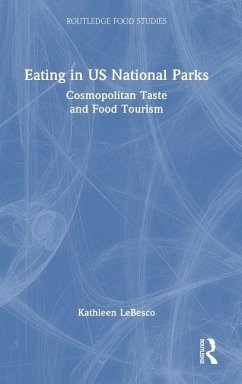This book presents a fascinating exploration of eating experiences within US national parks, explaining how, on what, and why people eat in national parks and how this has changed over the last century.
Hinweis: Dieser Artikel kann nur an eine deutsche Lieferadresse ausgeliefert werden.
Hinweis: Dieser Artikel kann nur an eine deutsche Lieferadresse ausgeliefert werden.
"A fascinating exploration of food in American national parks, and why menu options are so lackluster. Far more than a study of corporate concessions, LeBesco's Eating in US National Parks reveals how food eaten while camping, hiking, and sightseeing shapes the history and future of cosmopolitanism, taste, land, climate, and sovereignty."
Emily Contois, University of Tulsa
"Original and engaging, LeBesco's book offers a timely perspective on food in natural parks from "sad quesadillas" in visitor centers' cafés to high-end restaurants. Drawing on an impressive empirical material, the book elegantly connects the theme to discussions of cosmopolitanism, indigeneity, and alternative food experiences for the parklands of tomorrow."
Jonatan Leer, University of Aalborg
"Although many Americans frequently visit national parks and eat in them, little critical attention has been paid to what kind of food is available and under what circumstances it is consumed. In this book, Kathleen LeBesco asks uncomfortable questions: why isn't the food offer better and why isn't it in tune with the apparent mission of the parks, the local environments, and the indigenous communities that inhabit them? LeBesco takes us on a nation-wide tour to understand the motivations and the modus operandi of a variety of actors ranging from government agencies to corporate concessioners, and, of course, the park visitors themselves, who unintentionally treat their meals as arenas to negotiate taste, status, and identity."
Fabio Parasecoli, New York University
"Should a visitor to a national park expect specular food alongside a spectacular view? LeBesco's lively book answers this question by unpacking the salient intersections between beloved American landscapes and food hierarchies. The reader gains a fresh perspective on the paradoxes of park dining, which involve a delicate balancing act between taste and tackiness, conservation and pleasure-seeking, cheap concession-stands and upscale cosmopolitanism. A must-read for anyone interested in the intersection of nature, culture, and cuisine."
Josée Johnston, University of Toronto
Emily Contois, University of Tulsa
"Original and engaging, LeBesco's book offers a timely perspective on food in natural parks from "sad quesadillas" in visitor centers' cafés to high-end restaurants. Drawing on an impressive empirical material, the book elegantly connects the theme to discussions of cosmopolitanism, indigeneity, and alternative food experiences for the parklands of tomorrow."
Jonatan Leer, University of Aalborg
"Although many Americans frequently visit national parks and eat in them, little critical attention has been paid to what kind of food is available and under what circumstances it is consumed. In this book, Kathleen LeBesco asks uncomfortable questions: why isn't the food offer better and why isn't it in tune with the apparent mission of the parks, the local environments, and the indigenous communities that inhabit them? LeBesco takes us on a nation-wide tour to understand the motivations and the modus operandi of a variety of actors ranging from government agencies to corporate concessioners, and, of course, the park visitors themselves, who unintentionally treat their meals as arenas to negotiate taste, status, and identity."
Fabio Parasecoli, New York University
"Should a visitor to a national park expect specular food alongside a spectacular view? LeBesco's lively book answers this question by unpacking the salient intersections between beloved American landscapes and food hierarchies. The reader gains a fresh perspective on the paradoxes of park dining, which involve a delicate balancing act between taste and tackiness, conservation and pleasure-seeking, cheap concession-stands and upscale cosmopolitanism. A must-read for anyone interested in the intersection of nature, culture, and cuisine."
Josée Johnston, University of Toronto








